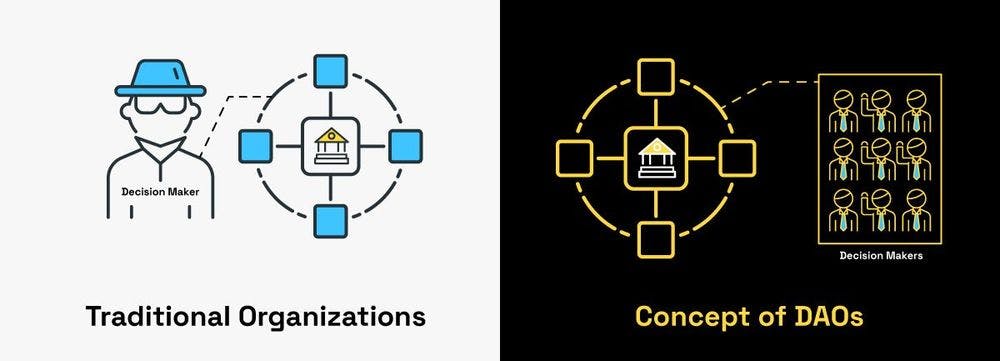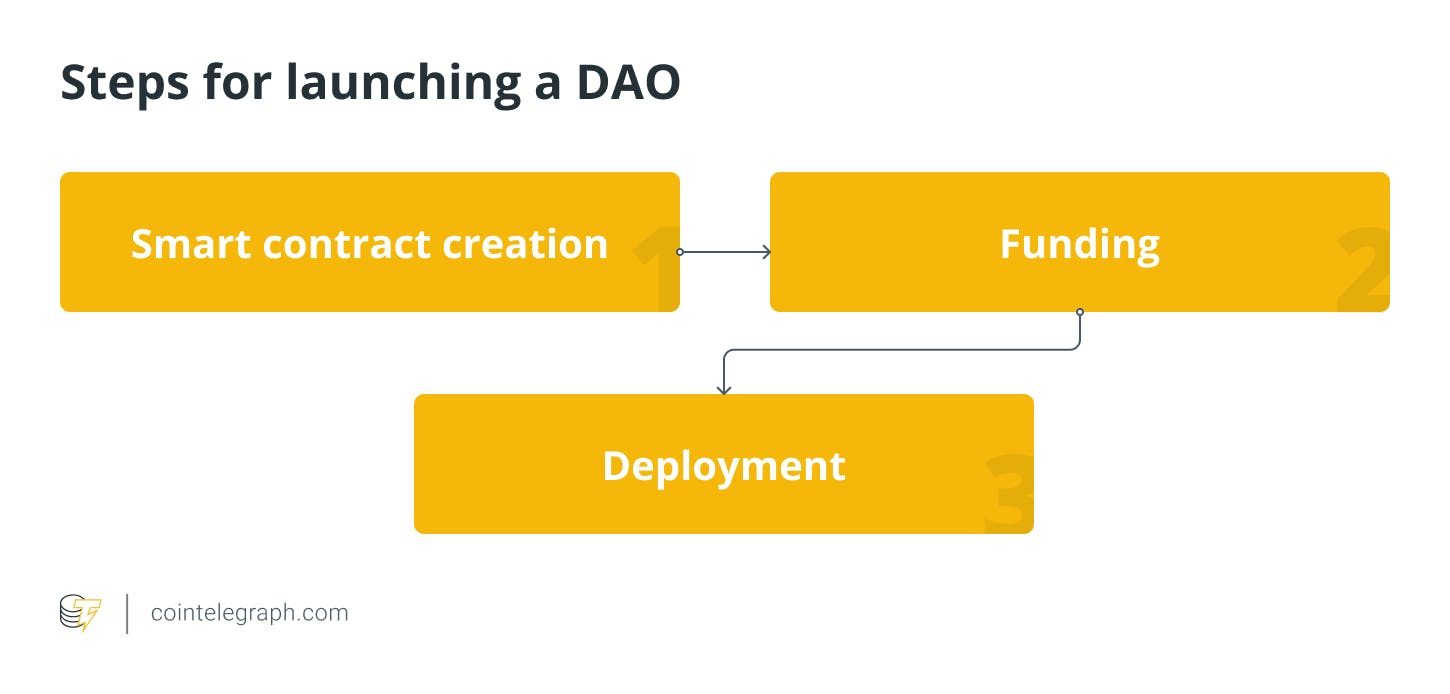Hello readers👋
Have you ever thought of a way of organizing with other people around the world, without knowing each other and establishing your own rules, and making your own decisions autonomously all encoded on a Blockchain? Well, DAOs are making this real.
Let us understand what DAOs are, how they function, and what are its challenges.
What does an organization mean
An organization is an entity such as a company, an institution, or an association comprising one or more people with a particular purpose, such as a business or government department.
Generally, we see that organizations have a CEO who makes all major decisions, they have a CFO who generally takes financial decisions, etc i.e these organizations follow a top-down hierarchical model of leadership with a centralized authority on top.
In the present era of cryptocurrencies and blockchain where everything is moving towards decentralization, why have organizations centralized?
Well, we can have organizations decentralized.
That is what DAOs are.
What are DAOs
DAOs stand for decentralized autonomous organizations. It refers to organizations with no central leadership. Decisions get made from the bottom-up, governed by a community organized around a specific set of rules enforced on a blockchain
Daos are just organizations that use blockchain for their operating activities
In a DAO, decisions are governed by proposals and voting to ensure everyone in the organization has a voice.
“Basically, a small group of people come together to form a chat group, and then they decide to pull capital together, [typically] using an Ethereum wallet,” Cooper Turley, an investor and builder of several popular DAOs, says
DAO:
- Decentralization: Not governed by one single, centralized entity.
- Autonomous: The DAO can automatically execute operations on its own without any intervention.
- Organization: The DAO is governed by its own predetermined rules, like an organization.
Why do we need DAO
Suppose you and your friend you met on the internet want to start an organization that involves funding and money. It requires a lot of trust in the people you’re working with here. But it's hard to trust someone you interacted with only a few times.
With DAOs, you don't need to trust anyone in the group. You just need to have trust in the DAOs code which is completely transparent and verifiable by everyone.
DAOs vs Traditional organizations

Examples of DAO
Let us look at some basic examples of DAO.
Charity
You could accept donations and membership from anyone in the world and the group can decide how they want to spend donations.
Freelancer network
You could create a network of contractors who pool their funds for office spaces and software subscriptions.
Ventures and grants
You could create a venture fund that pools investment capital and votes on ventures to back. Repaid money could later be redistributed amongst DAO members.
How does DAO works?
DAOs operate through smart contracts which are essentially chunks of code that automatically execute whenever a set of criteria are met. These smart contracts are deployed on the blockchain like Ethereum.
These smart contracts establish the DAO’s rules. Those with a stake in a DAO then get voting rights and may influence how the organization operates by deciding on or creating new governance proposals.
This model prevents DAOs from being spammed with proposals: A proposal will only pass once the majority of stakeholders approve it. How that majority is determined varies from DAO to DAO and is specified in the smart contracts.
Now you might be thinking how can you be a part of some DAO. Well, here is the answer.
How to participate in a DAO?
To participate in a DAO, Internet users buy voting rights by paying cryptocurrencies. These voting rights give them the ability to indicate what the DAO should invest in.
Ex - MakerDAO
DAOs like Bored ape yacht club(BAYC) where users have to afford one of the expensive NFTs to get members-only access to the community.
Some DAOs are not limited by tokens. which means that someone joining Discord for the community does not need to have invested in the organization.
Steps for a DAO Launch
- Smart contract creation
- Funding
- Deployment

Smart contract creation:
First, a developer or group of developers must create the smart contract behind the DAO. After launch, they can only change the rules set by these contracts through the governance system.
Funding:
After the smart contracts have been created, the DAO needs to determine a way to receive funding and how to enact governance. More often than not, tokens are sold to raise funds; these tokens give holders voting rights.
Deployment: Once everything is set up, the DAO needs to be deployed on the blockchain. From this point on, stakeholders decide on the future of the organization.
Features of DAO
🔸Decentralized
🔸Automated
🔸Transparent
🔸Community driven
🔸Potential investment returns
🔸Super scalable
Disadvantages of DAO
Decentralized autonomous organizations aren’t perfect. They are an extremely new technology that has attracted much criticism due to lingering concerns regarding their legality, security, and structure.
Summary
DAOs help create a new world of governance by assisting many blockchain projects to achieve the ideal decentralization. As internet-native organizations, DAOs have the potential to change the way corporate governance works completely.
As DAO’s legal challenges are clarified and managed, more and more organizations will look to adopt DAO platforms for their businesses, to automate certain aspects of their core business activities.
Conclusion
This is the end of the blog.
I hope you understand what DAOs are by now. Let me know your thought in the comment below.Do like this blog and follow me!
Also, you could follow me on Twitter
Thanks for reading💛